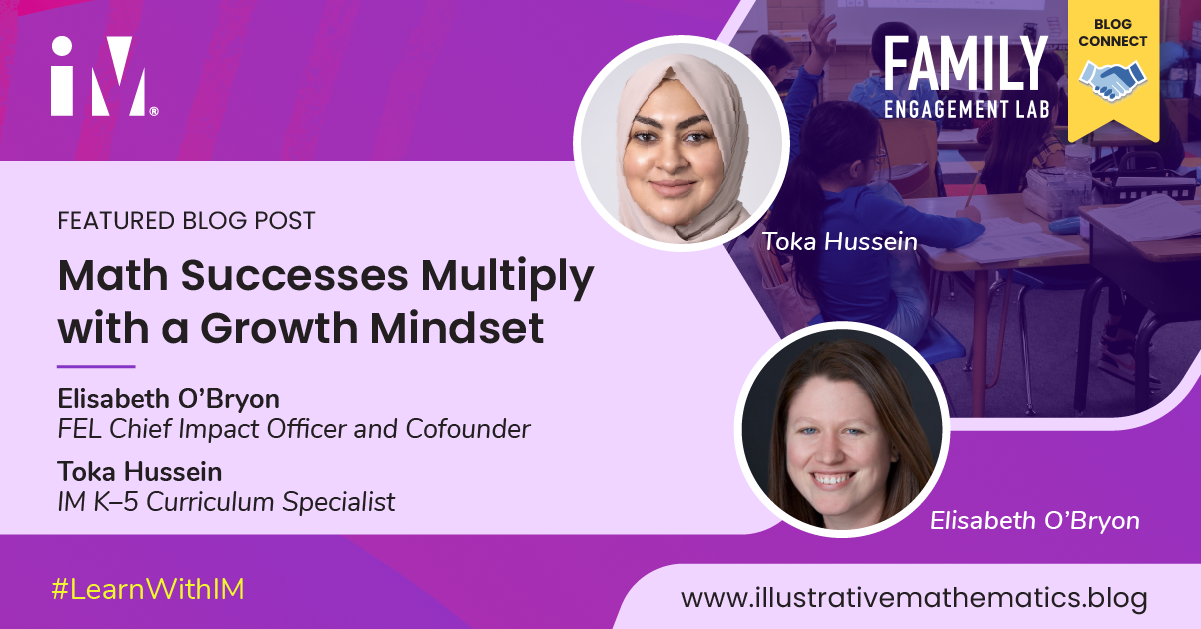By Dr. Elisabeth O’Bryon, Chief Impact Officer and Co-Founder of Family Engagement Lab and
Toka Hussein, K-5 Curriculum Specialist at Illustrative Mathematics
Illustrative Mathematics (IM) and Family Engagement Lab (FEL) have collaborated to produce a three-part blog series on the ways educators and families can partner in creating positive math experiences for their students.
In our first blog, we discuss the importance of having a growth mindset when approaching mathematical education. To learn more, we spoke with FEL Chief Impact Officer and Cofounder Elisabeth O’Byron and IM K–5 Curriculum Specialist Toka Hussein.
Elisabeth and Toka, it’s so nice to meet with you. Before we dive into our discussion of fostering a positive growth mindset, let’s learn more about you both. What connects you to K–12 education?
Elisabeth: I feel connected to K–12 education in many ways. In addition to being an elementary school parent, I have my PhD in school psychology and started my career in education as a bilingual school psychologist. Working closely with Spanish-speaking students and families, I observed the critical need for learning-focused partnership between teachers and multilingual families. I cofounded Family Engagement Lab in 2016 with the unwavering belief in the power of families to support their children’s learning and development. Through our research, we have found that the key to unlocking the potential of families is strengthening the connections between the key adults that shape a child’s life: family members and teachers.
Toka: Family has had a profound impact in how I view and am connected to K–12 education. Some might say it runs in the family. My mother is also a math educator—we even had the privilege of teaching at the same school!
Throughout the years, my passion for learning evolved into a love for teaching and a passion for witnessing students nurture their own enthusiasm for learning. This led me to a journey of studying childhood education, where I later specialized in elementary mathematics. I served as an elementary school teacher, predominantly focusing on math instruction, before transitioning to math content writing.
Where do you see the role of having access to high-quality instructional materials to shape students’ educational experience?
Toka: Instructional materials play a crucial role in shaping students’ educational experience. High-quality instructional materials lead to improved student learning outcomes and are critical to providing an equitable and positive learning experience for all learners. With high-quality instructional materials, educators can see an increased level of engagement with students, facilitate richer conversations, and establish a safe learning environment where students feel comfortable taking academic risks. These materials also equip teachers with instructional and content knowledge support to help them in effectively meeting the diverse needs of their students.
Elisabeth: At Family Engagement Lab, we are focused on building bridges between classroom learning and out-of-school learning. We see the impact of high-quality instructional materials on student outcomes and see an important opportunity to meaningfully loop in families who also play a highly influential role on student achievement. Our program, FASTalk (Families and Schools Talk) is designed to help create learning-focused connections between teachers and families. Through weekly text messages in families’ home language, FASTalk provides key information about what students are learning in addition to accessible, actionable tips and strategies that families can use to reinforce classroom learning outside of school.
We hear a lot about growth mindsets in education. Why are positive growth mindsets in math so important?
Elisabeth: Positive growth mindsets in math are important in many ways. Research demonstrates that students’ mindsets toward math influence their academic behavior and consequent academic performance. With a growth mindset, students believe that their skills and ability grow with their effort. When faced with a challenge, they are more willing to persevere and work harder, believing that their efforts will help them overcome barriers. Fostering a growth mindset is also critical from an equity perspective, as it can counteract negative stereotypes about perceived intelligence by promoting the belief that intelligence is not fixed and one’s abilities can improve over time with effort.
Toka: Having a growth mindset in math empowers students and gives them ownership of their learning. Through a growth mindset, students learn the power of persistence, perseverance, and resilience. They come to understand that their mathematical abilities can be developed and are not fixed, which ultimately leads to greater math achievement. New opportunities and limitless potential are unlocked when students (and adults) shift their thinking to view mistakes and challenges as opportunities for learning and growth. Through a growth mindset, students develop skills, traits, and attitudes that are beneficial not just in the classroom, but in all aspects of their lives.
Elisabeth: Toka makes a really important point about how a growth mindset is beneficial beyond the classroom setting. There are so many opportunities when students—and all of us!—encounter challenges and obstacles that require persistence, resilience, perseverance, and a belief in one’s ability to grow and improve. A growth mindset fosters these qualities by encouraging us to see setbacks as opportunities for learning and development rather than as insurmountable barriers.
From the curriculum perspective, how do IM teacher resources address the importance of positive math mindsets?
Toka: As a problem-based curriculum, the principles, beliefs, and values that guided the design of IM set the foundation for and create structures that support the development of a positive math mindset. We believe that all students are capable learners of math, a principle evident in our curriculum and professional learning.
The structure of the IM curriculum, along with the embedded instructional routines, support developing positive math mindsets through their invitational nature and by establishing routines that allow students to focus on deep and meaningful engagement with mathematics.
Positive math mindsets are also built through establishing a positive math community. The IM curriculum supports teachers in establishing that positive math community by prompting students to think about their role in their classroom math community and reflect on their teachers’ roles. Over the course of a unit, students continue to revise, reflect, and create norms. IM also includes teacher reflection questions for every lesson in K–5 and for every section in 6–12, some of which target building a strong math community and support developing students’ math identities.
How is FASTalk supporting the ability of families to promote growth mindsets in math for their children? What does that look like?
Elisabeth: In addition to sharing specific information about the skills and concepts students are learning in math, FASTalk also sends tips and strategies designed to help families model and promote growth mindsets with their children. For example, a parent may receive a FASTalk message that says:
Did you know a parent’s view of math affects how their child feels about it? When parents are positive and curious about math, kids feel more confident and motivated to learn.
Or a message like this, which provides a conversation starter for families that reinforces the importance of growth mindsets in math:
During car rides or while waiting in line, ask your child about a math problem they found challenging. Encourage them to share how they solved it and what they learned from any mistakes. Praise their effort!
It’s not just about students having a growth mindset though, is it? Why is it important for the adults in students’ lives to model a growth mindset and positive attitude toward math?
Elisabeth: Adults are powerful models for children! Children are taking in what they observe—both the words and actions—of the key adults in their lives, like family members and teachers.
Research shows that adults play a powerful role in the transmission of attitudes to, interest in, and the value given to math. When modeling a positive growth mindset toward math, they show children that it’s normal and beneficial to approach challenges with perseverance and enthusiasm. Additionally, adults who model a growth mindset and positive attitude toward math can help students see the real-world relevance and applicability of mathematical concepts. By sharing examples of how math is used in various fields and industries, adults can help students understand the importance of developing strong mathematical skills for future success. This connection to the real world can motivate students to engage more deeply with math and see its value beyond the classroom.
Toka: That’s so right! Additionally, the language adults use to talk about their own relationship with math can have a direct impact on a child’s relationship with math. Adults can serve as role models for young learners and can inspire students to have a growth mindset and positive attitudes by modeling their own.
In the classroom, students are learning a lot more from teachers than just content. Students watch and learn from their interactions with teachers, including how to handle challenging problems and situations. A teacher’s attitudes and beliefs about math influences the classroom environment. Teachers who model a growth mindset encourage their students to take risks and celebrate growth.
What would you recommend to teachers and families who are trying to help children develop a growth mindset in mathematics?
Toka: Teachers and families who are trying to foster growth mindsets in children should model having a growth mindset. Demonstrate that it is okay to take risks and make mistakes by doing so yourself. Highlight these mistakes as valuable learning opportunities. The vulnerability in doing so will show students that it is safe for them to do the same. These are valuable moments where children can see the power of perseverance and how to overcome obstacles. Equally important is using positive and encouraging language when doing and talking about mathematics. Emphasize effort over outcome, focus praise on efforts, and celebrate growth. This reinforces that growth is a direct result of efforts.
Elisabeth: Teachers and families who are trying to help children develop a growth mindset should be cognizant of the power of their words and actions. Demonstrate a positive attitude toward math, share your own struggles and successes, and emphasize the importance of perseverance and resilience in learning. Incorporating language that promotes a growth mindset into conversations about math can also be really powerful. Encourage phrases like “I can’t do it . . .yet” or “This is challenging, but I’ll keep trying” to reinforce the idea that abilities can be developed over time with effort and practice.
Conclusion
Developing a positive growth mindset is a critical part of a student’s math journey, and one where teachers and families can play a powerful role by modeling and fostering healthy relationships and interactions with math. Illustrative Mathematics and Family Engagement Lab can help support those efforts. To learn more:
Schedule a call with Illustrative Mathematics
Schedule a call with Family Engagement Lab
 Dr. Elisabeth O’Bryon
Dr. Elisabeth O’Bryon
Chief Impact Officer and Co-Founder of Family Engagement Lab
Dr. Elisabeth O’Bryon is the Chief Impact Officer and Co-Founder of Family Engagement Lab. Previously, Elisabeth served as the Director of Research and Evaluation at GreatSchools, and a Postdoctoral Research Associate at the Yale Center for Emotional Intelligence where she contributed to the development and evaluation of school-based social and emotional learning programming for children, teachers, and families. Elisabeth has a doctorate in psychology and experience providing school psychological services to preschool through high school-age students in both English and Spanish.
 Toka Hussein
Toka Hussein
K-5 Curriculum Specialist at Illustrative Mathematics
Toka Hussein is a K-5 Curriculum Specialist at Illustrative Mathematics. She holds a BA in Childhood Education and Psychology and earned an MSeD in the Elementary Math Specialist program at Hunter College. She has served as a Math Content Specialist, with a focus in content development and assessment. Her journey in education also includes serving as a New York City public school teacher, teaching math and science at the elementary level.
